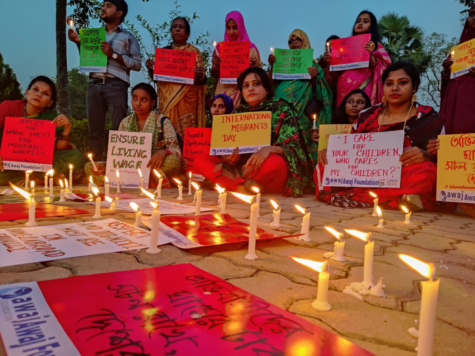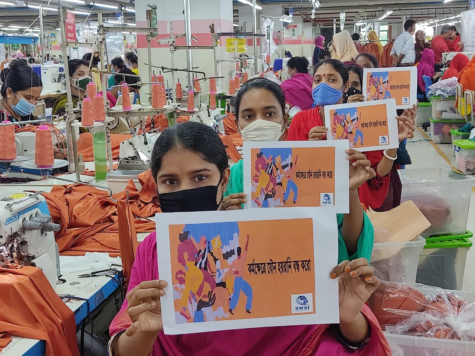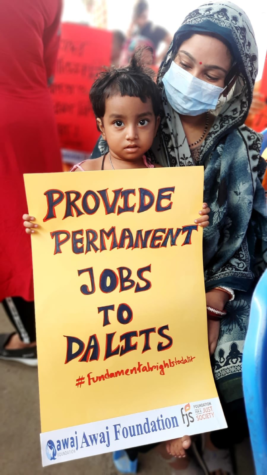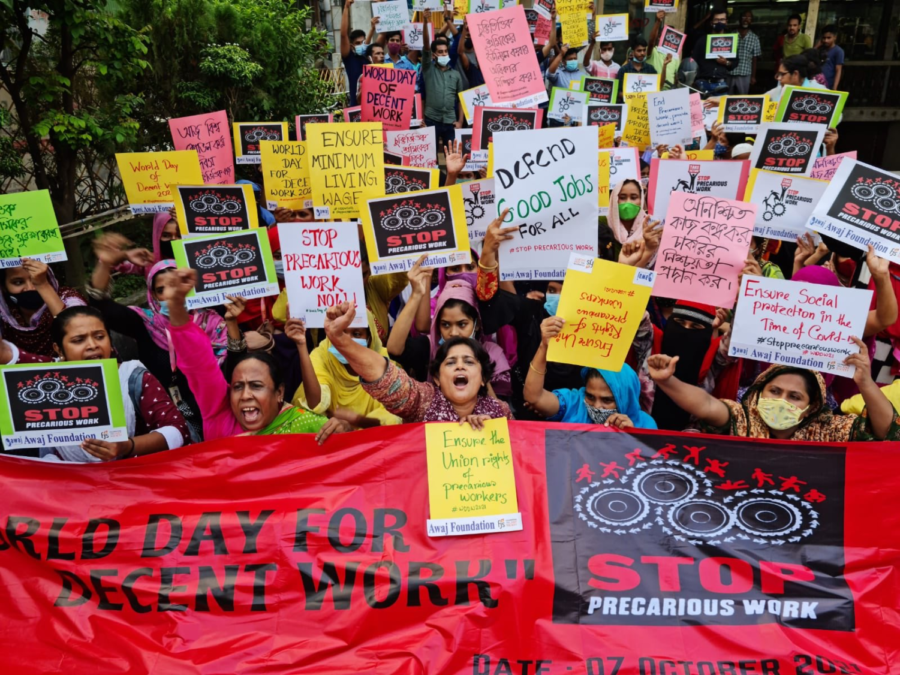Fast Fashion and Its Consequences: The Struggle of Bengali Garment Workers
If we want to advance past the horrors of colonialism, we cannot ignore how consumption and global industry harm the third world.
Nazma Akter and other Bengali workers protest for an end to job insecurity.
The first world no longer troubles itself with industrial manufacturing; instead, it has been delegated to the rest of the world. “Made in the USA” has rarely been seen for decades, and from its remnants rises “Made in Bangladesh.” The tag, in its itchiness, provides a reminder of the hands who worked to provide the warmth of your clothes. Those hands belong to a person’s own body, a fact that is often overlooked when the next Tommy Hilfiger sweatshirt is purchased.
That reality was violently reasserted on April 24th, 2013, when Rana Plaza, an eight-story commercial building where thousands of garment workers toiled, collapsed. 1,132 were killed and 2,500 injured in a disaster that was ten times more deadly than the notorious Triangle Shirtwaist Factory Fire in New York City on March 25th, 1911.
“Many lost their lives; many lost their hands or feet. Mentally, it was traumatizing. Some couldn’t sleep at night in fear. Some became mentally unstable,” said Nazma Akter, the founder of Awaj Foundation, one of the largest Bengali labor rights organizations, representing over one hundred thousand workers.

Like the revelation that iPhones and other consumer goods were cheaply produced by workers in sweatshops, the collapse of Rana Plaza prompted some global action, but ultimately did nothing to remedy the fundamental problems. Akter confirms this, noting that “still today, many victims of Rana Plaza didn’t get the proper compensation and no steps have been taken to reintegrate these damaged people into the mainstream of society.”
Retailers such as Walmart, H&M, and Zara who vowed to ethically source their products have fallen short on these promises. “Being a Bengali working-class woman, the suffering for me includes cheap labor, gender-based violence at the workplace, wage discrimination, and maternity benefit issues,” said Akter.
A Diagnosis of Consumption
While globalization has fundamentally changed Western society, connecting consumers to products and services from around the world, the conditions preceding globalization have produced a very specific dichotomy between the West and the rest of the world.
The difference in development between Western and postcolonial countries is tremendous. In striving to reach the same heights, postcolonial countries must enter the global market, causing Western countries to become less reliant on domestic production as a result. In fact, in 2020, the United States imported a total of $434.7 billion dollars worth of goods from China.
Consequently, in order to meet the demand for manufactured goods in the West, new industrial revolutions develop, and with them come new and more harsh ways to exploit the worker. “So-called development has made our lives hell,” said Akter.

Tobias Alam ’22, a Bengali student with a vested interest in the situation said, “The worker is alienated from his product to the highest degree possible, and the product is then shipped over to the first world to a consumer who has no clue what went behind the product.”
Alam describes a phenomenon known as commodity fetishism. The nature of any commodity conceals the labor that goes into its production. Due to its detachment from the production process, the commodity for the consumer becomes something much more than its utility and production process.
The sociologist Jean Baudrillard theorizes that the consumption of commodities becomes a way for people to approach a sense of self. This sense of self is facilitated by societal expectations, thus people consume to be recognized by the collective.
Fashion is the most outward expression of the self, and fast fashion takes advantage of this in its business model. It makes products that are cheaply bought and purchased in large quantities.
In their search for wholeness, people are enticed by inexpensive trendy clothes that will warrant approval by others. Individual agency is destroyed by the need to be seen by society and this need is exploited by firms seeking to maximize profits.
The consumer is alienated. There is something missing from their life, but trying to fill the gap is futile. It is a temporal feeling of being whole that will eventually dissipate, necessitating renewed consumption, though it will never be enough.
Professor of Critical and Contextual Studies at the London Metropolitan University and a member of the editorial board of the International Journal of Baudrillard Studies, Jon Baldwin provides further insight into consumption. “[It is] not an inability to get pleasure, so much as an inability to do anything else except pursue pleasure, to counter a sense that ‘something is missing.’ Consumption is not going to fill that gap.”

Commodity fetishism obscures production to the point that the importance of social recognition supersedes the destructive effects of consumption generating disastrous outcomes such as that of Rana Plaza as well as environmental damage and worker violations.
The EPA reports that the average American consumer throws away 81 pounds of clothing every year, an enormous amount of waste that exacerbates the climate crisis. Those pounds of clothing will continue to pile up while constant consumption remains a trend.
Akter adds “All those multi-storied factory buildings produce huge industrial waste creating a negative impact on our environment. Pollution, erosion in rivers, and overpopulation are resulting in a malnourished and sick generation.”
By supporting fast fashion firms, buyers also contribute to the mistreatment of foreign workers. According to the 2020 fashion transparency index, 93% of 200 major brands that were surveyed admitted that they were not paying garment workers liveable wages.
“The Bengali workforce faces a threat from corporate exploitation. They don’t have the right to freedom of association and collective bargaining is questionable,” said Akter. It is clear that for both consumers and workers, fast fashion has dire consequences.
Baldwin quotes Karl Marx to note that this contemporary situation is one in which “capital is ‘vampire-like,’ monstrous, cannibalistic, entering a zombie-phase, in the form of usury attaches itself to production as a parasite, making it miserable, sucking blood, and killing nerves.” Baldwin then said, “If capital is like a virus, spreading around the world, then to resist we need vaccinations.”
Cures for the Ailment
A vaccine makes the disease obsolete. Teach a man to fish, he eats for life. Teach a body to fight the disease, it is never again diseased. Is it possible for the collective human body to cure itself of the violent cycles of consumption?
To confront this, Baldwin proposes a look at the current COVID-19 pandemic. “[It] offers an imagination of a world beyond the dictates of the market. Within days flights were grounded, shops closed, venues shut, habits broken, paradigms shifted, life changed in ways that couldn’t have been imagined weeks before. So, change, progress, a new future is eminently possible.”
While providing hope that our current conditions can be overcome, the chance that the system caves in on itself cannot be completely relied on for a future free of the social relations that consumption conducts.
“The corporate answers to the canonical questions of philosophy, such as ‘Why are we here?’ and ‘What should I do?’ are answered thus: We are here for the market, and you should compete,” said Baldwin. So, for real change to occur, the battle must be fought on two fronts: the workers in the third world and the consumers in the first world must collectively retaliate against the corporation that compels competition and division.

One of these forms of retaliation is embodied in the word ‘refusal.’ “One refuses to be subject of, and subject to, capital, abandonment of consumption and employment,” Baldwin said. For the consumer, refusal to consume is a step towards freedom from the impositions of society. For the worker, refusal to work is risky but is similar to the freedom of the consumer.
Refusal in both cases grants the ability to realize one’s individuality and to destroy the corporate entity that separates the groups. To refuse is not simply to stop but to actively revolt. This is something that Akter and her foundation engage with every day.
“I’ve joined in many strikes and demonstrations. It’s actually an everyday job. Wherever there is unrest or protest, it’s your duty to rush to the place. Still, today, whenever we raise our voice or demand our rights, we face pressure from governments and the community. But all these bitter experiences became my strength, and now we are fighting to achieve a fair future,” said Akter.
Workers in Bangladesh hold strikes and demonstrations as a form of refusal. They are acting in ways that damage the goals of the institutions that subjugate them which often leads to attacks on the part of these institutions.
However, Akter and the workers she helps all hope to secure a future free from exploitation. “You know, it’s ‘anger, hope, action’ — that’s my driving force. Because without hope and anger, our demands cannot be fulfilled,” she said. Anger and hope —two sides of the same coin — inspire and carry action to its fruition.
It is easier said than done to act against the current, against a power that cannot really be perceived in its entirety. The imminent reality of the climate crisis and worker mistreatment, however, serves as a call to action for consumers and workers worldwide. Collective action through refusal holds the potential to push the world past the violence of consumption.
“[It is] not an inability to get pleasure, so much as an inability to do anything else except pursue pleasure, to counter a sense that ‘something is missing.’ Consumption is not going to fill that gap,” said Professor of Critical and Contextual Studies at the London Metropolitan University and a member of the editorial board of the International Journal of Baudrillard Studies, Jon Baldwin.
Rahib Taher is a Copy Chief for 'The Science Survey.' He enjoys journalistic writing as it gives him the liberty to write about topics that interest him....

